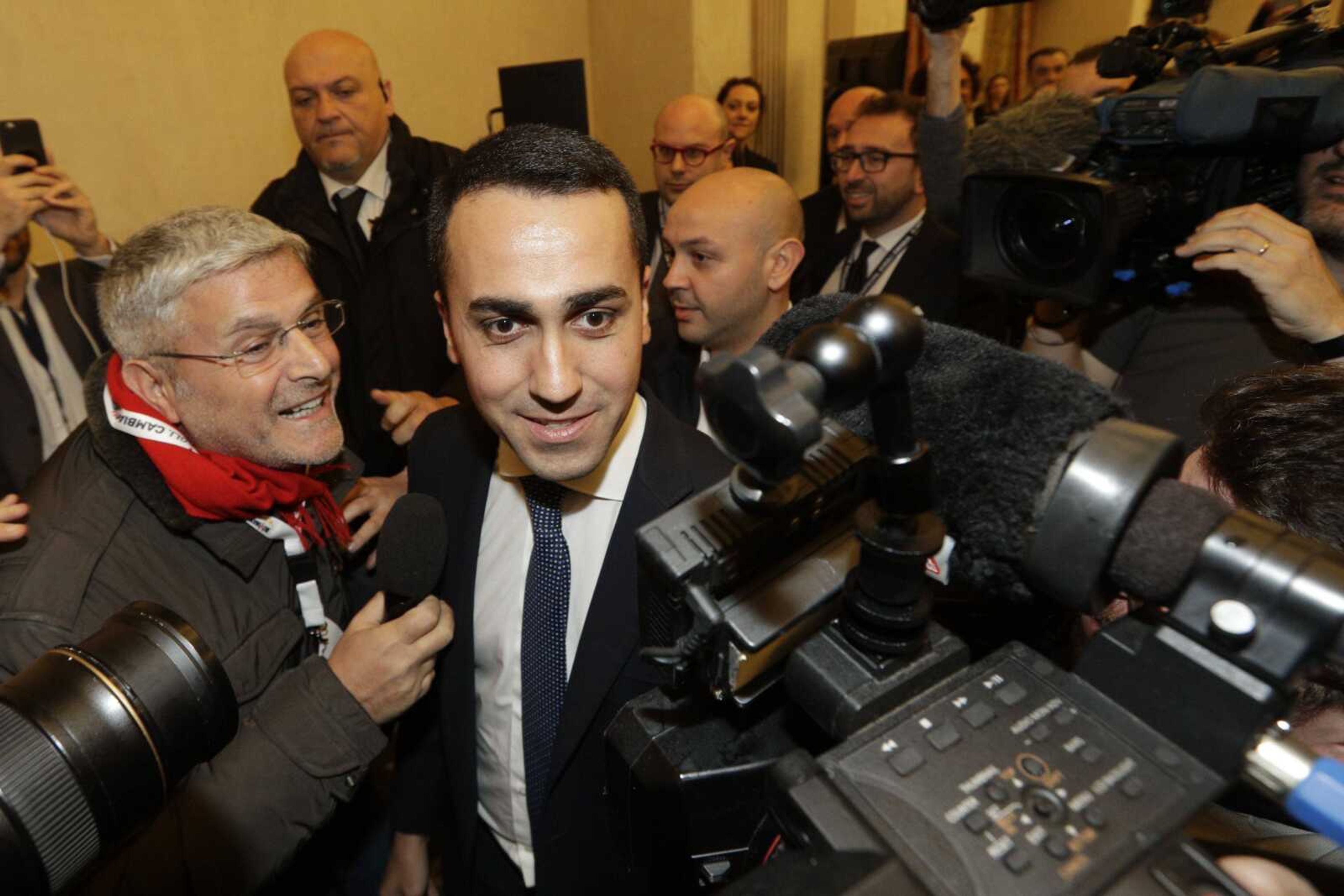Italian election results cast pall over the European Union
BRUSSELS -- Since the European Union's founding treaty was signed in Rome more than 60 years ago, Italy has been an unabashed booster of increased unity and common purpose. That may have come to an end. Euroskeptics and populists rode a wave of hostility toward all things EU and surged to the fore in Italian elections Sunday, turning the founding EU nation into a potential obstructionist just when the bloc was emerging from a decade of economic gloom and seemed poised to rekindle its grand ambitions.. ...
BRUSSELS -- Since the European Union's founding treaty was signed in Rome more than 60 years ago, Italy has been an unabashed booster of increased unity and common purpose. That may have come to an end.
Euroskeptics and populists rode a wave of hostility toward all things EU and surged to the fore in Italian elections Sunday, turning the founding EU nation into a potential obstructionist just when the bloc was emerging from a decade of economic gloom and seemed poised to rekindle its grand ambitions.
Beyond moving away from the EU policies in Brussels, the Italian results were the latest indication the continent is tilting further to the right.
Sunday's stunning outcome came at the end of a seesaw day for the EU, which started out well enough when the German Socialists finally threw their weight behind a staunchly pro-Europe grand coalition under Chancellor Angela Merkel.
Now, it seemed, the Merkel-Emmanuel Macron partnership was on and the German-French engine was primed to push a core group of EU nations toward more unity.
Then, Italy's results started to come in and the message from Italian voters was clear: "Don't necessarily count on us." Instead of a smooth ride under fair weather economic conditions, the bloc should brace for more of the chaos and havoc anti-EU populists have spread in many member nations over the past few years.
"The European Union is having a bad evening," France's far-right Marine Le Pen tweeted elatedly as it became clear more than half the Italian electorate had backed two stridently anti-EU parties.
Le Pen may have been a washout in last year's French presidential elections against Macron, and Germany's established parties may have closed ranks against the right-wing nationalist AfD in Parliament, but populism, sometimes combined with the far right, is thriving and in power from Poland's shipyards to the coffee tables of Vienna. In Hungary, Viktor Orban has been in power with his style of so-called "illilberal" democracy in Hungary since 2010.
Despite such precedents, Sunday's results from Rome still came as a shock to the EU. It was barely a week ago EU Commission President Jean-Claude Juncker had confidently predicted that "whatever the outcome, I am confident that we will have a government that makes sure that Italy remains a central player in Europe and in shaping its future."
One of the first things Matteo Salvini, the head of Italy's victorious anti-migrant, euroskeptic League party, said Monday was the shared euro currency was "wrong." The EU is still smarting badly from Britain's 2016 decision to leave the bloc, so another ally turning a cold shoulder is the last thing the bloc needs.
"The outcome of the elections could not be farther away from what the European Commission, as well as most other EU governments, were hoping for," said the Europe think tank VoteWatch, calling it an "unprecedented political shock."
So instead of the likes of Juncker and EU President Donald Tusk singing the praises of Italy, it was left to their ideological opposites to laud the rise of the anti-establishment vote.
"This is a huge surge for euroskeptic and anti- establishment parties in Italy," said Nigel Farage, who was a driving force behind Britain's exit from the EU. His Italian allies in the European Parliament, the 5-Star Movement, were the biggest winners in Sunday's polls.
The brainchild of comedian Beppe Grillo, the 5-Star Movement was long considered an itchy thorn in the EU's side at best, a droll antidote to the sometimes deadening debate at the European Parliament. So was Farage, until Brexit wiped the smile off legislators.
Pending the outcome of government coalition talks, the 5-Star Movement could set Italy's EU policy for years to come.
And together with other populist and far-right movements, Sunday's vote shows they could well move from the fringes of the European legislature to dominate debate after the EU-wide elections of May 2019.
However politically disruptive this looks, such forces also know how to add water to their wine.
For all his anti-EU talk, Orban is still firmly entrenched in the pro-EU European People's Party group of Juncker and Tusk. And the abrasive disputes between Warsaw and Brussels have also abated somewhat in recent weeks.
As for Italy, the politics of compromise there has been elevated to an art.
"Recently they have already toned down their virulent anti-EU talk," said Hendrik Vos, a professor of European politics at Ghent University in Belgium, referring to Italy's anti-establishment parties. "Let's not panic just yet."
Connect with the Southeast Missourian Newsroom:
For corrections to this story or other insights for the editor, click here. To submit a letter to the editor, click here. To learn about the Southeast Missourian’s AI Policy, click here.









